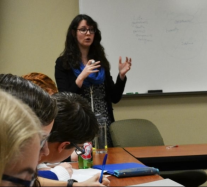 The Rhythmic Theology Project is a program of research concerning the theological significance of the rhythms through which humans live. As a phenomenon that invokes many of the formal polarities that shape existence – space and time, pattern and variation, individual and collective – rhythm illuminates the connections between doctrine, practice, and culture through which religion engages human life.
The Rhythmic Theology Project is a program of research concerning the theological significance of the rhythms through which humans live. As a phenomenon that invokes many of the formal polarities that shape existence – space and time, pattern and variation, individual and collective – rhythm illuminates the connections between doctrine, practice, and culture through which religion engages human life.
The project was first conceived at the University of Oxford in 2012 in the form of a DPhil dissertation in Christian theology. Drawing on the arts and social sciences, Lexi Eikelboom developed a framework for the theological analysis and evaluation of various theologians’ and philosophers’ use of rhythm.
The project then became a book with Oxford University Press, titled Rhythm: A Theological Category, which lays the groundwork for thinking about rhythm theologically, that is, as pertaining to doctrines of metaphysics, creation, salvation, analogy, the church etc. You can read reviews of the book here, here, here, and here, as well as an interview with the author here.

Rhythm and Ethics class at the Rhythm! Discovery Center in Indianapolis.
These developments took place over the course of the three years that Lexi spent as the Postdoctoral Teaching Fellow at the John Wesley Honors College. In that time, the project expanded to include courses in which undergraduate students were invited to participate in Lexi’s research on rhythm, as well as this blog, which sought to explore the significance of rhythm in questions about individual and social lives.
Currently at the Institute for Religion and Critical Inquiry, Eikelboom is now working on several other projects that involve bringing aesthetic concepts and artistic practices to bear on philosophical and theological research.